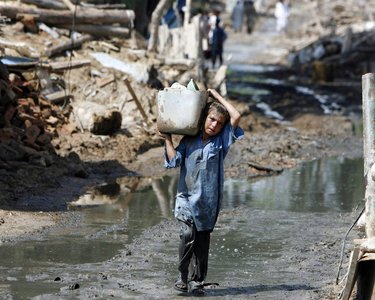The scale of the flooding in Pakistan in 2022 was immense, affecting an estimated 33 million people, with 7.9 million displaced and an estimated US$30 billion in combined losses and damages. However, evidence from the report shows that the international response failed to keep up with need; funding was inadequate, and there was a a focus on debt-based financing, rather than large-scale humanitarian and grant-based support.
The report explores the role of the international humanitarian system in middle-income countries with substantial government, civil society and disaster management capacity and how the international response can better complement and support national systems in these contexts.
Partners
Humanitarian Outcomes
Sustainable Development Policy Institute
Recommendations / learning
Grant based funding has been disproportionately low - the humanitarian presence has gradually decreased in Pakistan over the past decade, partly as a result of the country's middle-income status and an increasingly restrictive operating environment; this limited the potential for a rapid and widespread response commensurate with the level of the crisis.
The international humanitarian system works best in the absence of functioning institutions - in middle-income countries such as Pakistan, the humanitarian response needs to be strategic in supporting government and civil society in areas where the most value can be added, such as tackling exclusion and accountability challenges, and providing more direct support to locally led responses.
As the risk of climate-driven disasters increases, lessons about disaster risk reduction investment, and what improvements or changes need to be made, are critical.
Resources
Floods in Pakistan: Rethinking the humanitarian roleThis report on the humanitarian response to flooding in Pakistan is the second in a series of rapid reviews conducted by Humanitarian Outcomes under the Humanitarian Rapid Research Initiative (HRRI). This document is also available in the following languages: |
Download |
